苏教译林版小学英语3-6年级知识点总结
译林三到六年级英语知识点
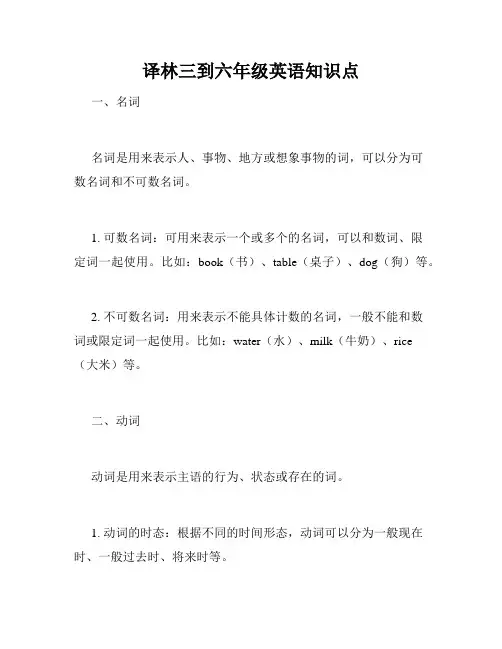
译林三到六年级英语知识点一、名词名词是用来表示人、事物、地方或想象事物的词,可以分为可数名词和不可数名词。
1. 可数名词:可用来表示一个或多个的名词,可以和数词、限定词一起使用。
比如:book(书)、table(桌子)、dog(狗)等。
2. 不可数名词:用来表示不能具体计数的名词,一般不能和数词或限定词一起使用。
比如:water(水)、milk(牛奶)、rice(大米)等。
二、动词动词是用来表示主语的行为、状态或存在的词。
1. 动词的时态:根据不同的时间形态,动词可以分为一般现在时、一般过去时、将来时等。
- 一般现在时:表示经常性、习惯性或客观事实。
例如:I go to school every day.(我每天去学校。
)- 一般过去时:表示过去发生的动作或存在的状态。
例如:She played soccer yesterday.(她昨天踢足球。
)- 将来时:表示将来要发生的动作或存在的状态。
例如:We will have a party tomorrow.(我们明天要开派对。
)2. 动词的语态:根据动作的主动或被动性质,动词可以分为主动语态和被动语态。
- 主动语态:表示主语执行动作。
例如:He wrote a letter.(他写信。
)- 被动语态:表示主语接受动作。
例如:The letter was written by him.(这封信是他写的。
)三、形容词形容词是用来形容名词的词。
1. 形容词的位置:形容词通常位于名词前边,用来修饰名词。
例如:a beautiful flower(一朵美丽的花)。
2. 形容词的比较级和最高级:形容词有原级、比较级和最高级三种形式。
- 原级:形容词的原级表示事物的基本特征。
例如:happy(快乐的)、big(大的)。
- 比较级:形容词的比较级表示两个事物之间的比较关系,一般在形容词后面加上-er。
例如:happier(更快乐的)、bigger(更大的)。
- 最高级:形容词的最高级表示三个或以上事物之间的比较关系,一般在形容词后面加上-est。
教学计划(知识清单)-2023-2024学年译林版英语3-6年级
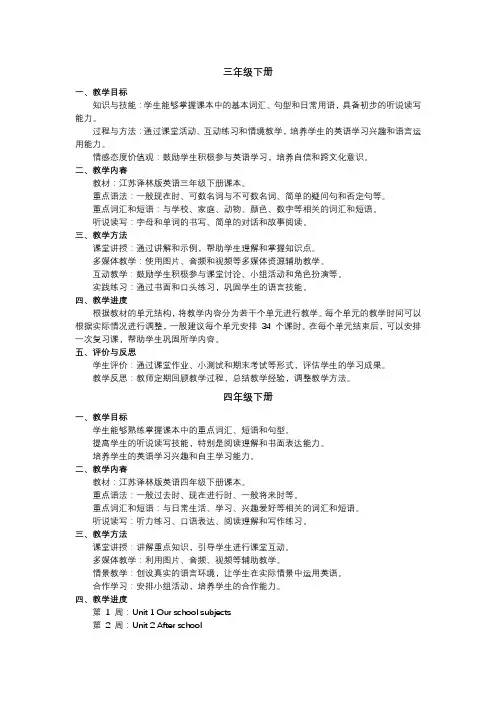
三年级下册一、教学目标知识与技能:学生能够掌握课本中的基本词汇、句型和日常用语,具备初步的听说读写能力。
过程与方法:通过课堂活动、互动练习和情境教学,培养学生的英语学习兴趣和语言运用能力。
情感态度价值观:鼓励学生积极参与英语学习,培养自信和跨文化意识。
二、教学内容教材:江苏译林版英语三年级下册课本。
重点语法:一般现在时、可数名词与不可数名词、简单的疑问句和否定句等。
重点词汇和短语:与学校、家庭、动物、颜色、数字等相关的词汇和短语。
听说读写:字母和单词的书写、简单的对话和故事阅读。
三、教学方法课堂讲授:通过讲解和示例,帮助学生理解和掌握知识点。
多媒体教学:使用图片、音频和视频等多媒体资源辅助教学。
互动教学:鼓励学生积极参与课堂讨论、小组活动和角色扮演等。
实践练习:通过书面和口头练习,巩固学生的语言技能。
四、教学进度根据教材的单元结构,将教学内容分为若干个单元进行教学。
每个单元的教学时间可以根据实际情况进行调整,一般建议每个单元安排 34 个课时。
在每个单元结束后,可以安排一次复习课,帮助学生巩固所学内容。
五、评价与反思学生评价:通过课堂作业、小测试和期末考试等形式,评估学生的学习成果。
教学反思:教师定期回顾教学过程,总结教学经验,调整教学方法。
四年级下册一、教学目标学生能够熟练掌握课本中的重点词汇、短语和句型。
提高学生的听说读写技能,特别是阅读理解和书面表达能力。
培养学生的英语学习兴趣和自主学习能力。
二、教学内容教材:江苏译林版英语四年级下册课本。
重点语法:一般过去时、现在进行时、一般将来时等。
重点词汇和短语:与日常生活、学习、兴趣爱好等相关的词汇和短语。
听说读写:听力练习、口语表达、阅读理解和写作练习。
三、教学方法课堂讲授:讲解重点知识,引导学生进行课堂互动。
多媒体教学:利用图片、音频、视频等辅助教学。
情景教学:创设真实的语言环境,让学生在实际情景中运用英语。
合作学习:安排小组活动,培养学生的合作能力。
个人整理的新版苏教版小学英语3—6年级重点句型
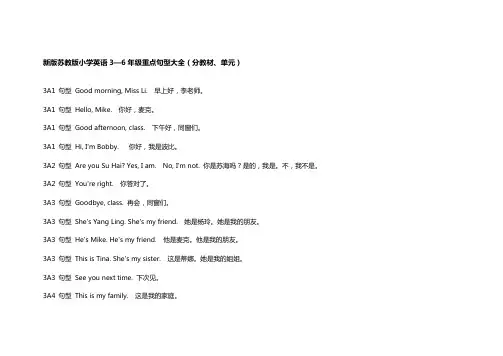
新版苏教版小学英语3—6年级重点句型大全(分教材、单元)3A1 句型Good morning, Miss Li. 早上好,李老师。
3A1 句型Hello, Mike. 你好,麦克。
3A1 句型Good afternoon, class. 下午好,同窗们。
3A1 句型Hi, I'm Bobby. 你好,我是波比。
3A2 句型Are you Su Hai? Yes, I am. No, I'm not. 你是苏海吗?是的,我是。
不,我不是。
3A2 句型You're right. 你答对了。
3A3 句型Goodbye, class. 再会,同窗们。
3A3 句型She's Yang Ling. She's my friend. 她是杨玲。
她是我的朋友。
3A3 句型He's Mike. He's my friend. 他是麦克。
他是我的朋友。
3A3 句型This is Tina. She's my sister. 这是蒂娜。
她是我的姐姐。
3A3 句型See you next time. 下次见。
3A4 句型This is my family. 这是我的家庭。
3A4 句型This is Tim. He's my brother. 这是蒂姆。
他是我的弟弟。
3A4 句型This is me. 这是我。
3A5 句型Look at my T-shirt. 看我的T恤衫。
3A5 句型It's nice. 它很漂亮。
3A5 句型How nice! 真好看!3A5 句型It's great. 它好看极了。
3A5 句型What colour is my T-shirt? 我的T恤衫是什么颜色的?3A5 句型They all look great! 他们都看上去很棒!3A6 句型What colour is this T-shirt? 这件T恤衫是什么颜色的?3A6 句型It's red and yellow. 它是红黄相间的。
苏教译林版小学英语3-6年级知识点总结
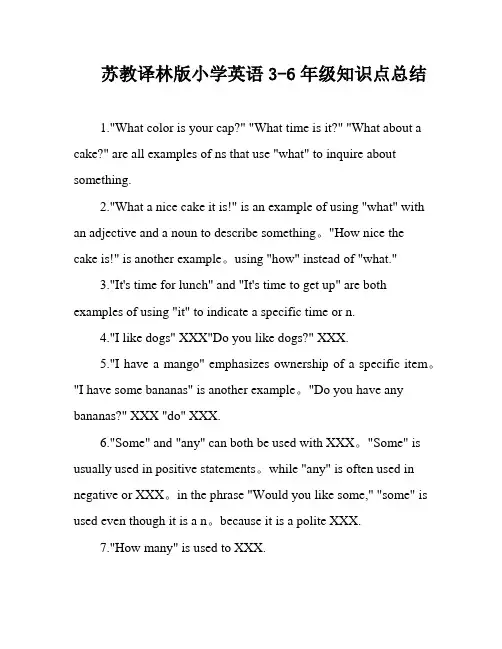
苏教译林版小学英语3-6年级知识点总结1."What color is your cap?" "What time is it?" "What about a cake?" are all examples of ns that use "what" to inquire about something.2."What a nice cake it is!" is an example of using "what" with an adjective and a noun to describe something。
"How nice the cake is!" is another example。
using "how" instead of "what."3."It's time for lunch" and "It's time to get up" are both examples of using "it" to indicate a specific time or n.4."I like dogs" XXX"Do you like dogs?" XXX.5."I have a mango" emphasizes ownership of a specific item。
"I have some bananas" is another example。
"Do you have any bananas?" XXX "do" XXX.6."Some" and "any" can both be used with XXX。
苏教版小学英语3-6年级词汇汇总-首字母填空
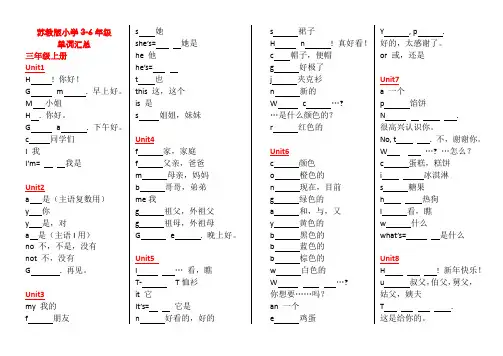
苏教版小学3-6年级单词汇总三年级上册Unit1H ! 你好!G m . 早上好。
M 小姐H . 你好。
G a . 下午好。
c 同学们I 我I’m= 我是Unit2a 是(主语复数用)y 你y 是,对a 是(主语I用)no 不,不是,没有not 不,没有G . 再见。
Unit3my 我的f 朋友s 她she’s= 她是he 他he’s=t 也this 这,这个is 是s 姐姐,妹妹Unit4f 家,家庭f 父亲,爸爸m 母亲,妈妈b 哥哥,弟弟me我g 祖父,外祖父g 祖母,外祖母G e . 晚上好。
Unit5l …看,瞧T- T恤衫it 它It’s= 它是n 好看的,好的s 裙子H n ! 真好看!c 帽子,便帽g 好极了j 夹克衫n 新的W c …?…是什么颜色的?r 红色的Unit6c 颜色o 橙色的n 现在,目前g 绿色的a 和,与,又y 黄色的b 黑色的b 蓝色的b 棕色的w 白色的W …?你想要……吗?an 一个e 鸡蛋Y , p .好的,太感谢了。
or 或,还是Unit7a 一个p 馅饼N .很高兴认识你。
No, t . 不,谢谢你。
W …? …怎么?c 蛋糕,糕饼i 冰淇淋s 糖果h 热狗l 看,瞧w 什么what’s= 是什么Unit8H ! 新年快乐!u 叔父,伯父,舅父,姑父,姨夫T .这是给你的。
d 玩具娃娃t 那,那个b 球r 机器人C 光盘c 小汽车H ! 生日快乐!t 玩具ah 啊ha 哈三年级下册Unit 1i 在上课S . 起立M 先生S . 坐下p 请o 开;打开the 这个;这些;那个;那些d 门s 对不起c 进来c 关上;合上w 窗,窗户b 黑板b 书r 橡皮don't =l 听p 鹦鹉Unit 2In 在……里l 图书馆Shh 嘘s 喊;叫r 跑;跑步e 吃h 这里;在这里t 说话;谈话s 睡觉d 喝m 牛奶E 英语y 你的,你们的Unit 3p 铅笔isn’t=that's=s 书包p 钢笔c 蜡笔r 尺p c 铅笔盒,铅笔袋l b 午餐盒w 在哪里Where’s=o t 在那里Unit 4b 鸟b 漂亮的;美丽的u 在……下面d 课桌;书桌b 在……的后面on 在……上面c 椅子t 树g 猜;猜测o 一t 二t 三oh 哦,啊wow 哇,呀Unit 5h 你多大?l 可爱的n 九e 八f 四f 五s 六s 七t 十r 对的;正确的o 出局W a n c !多么漂亮的蛋糕啊!M a w .许个愿吧。
苏教版小学英语3-6年级知识点整理
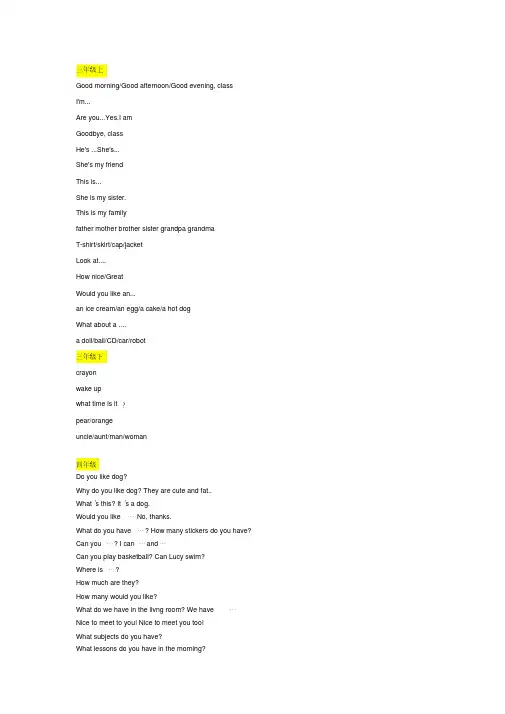
三年级上Good morning/Good afternoon/Good evening, classI'm...Are you...Yes,I amGoodbye, classHe's ...She's...She's my friendThis is...She is my sister.This is my familyfather mother brother sister grandpa grandmaT-shirt/skirt/cap/jacketLook at....How nice/GreatWould you like an...an ice cream/an egg/a cake/a hot dogWhat about a ....a doll/ball/CD/car/robot三年级下crayonwake upwhat time is it?pear/orangeuncle/aunt/man/woman四年级Do you like dog?Why do you like dog? They are cute and fat..What’s this? It’s a dog.Would you like … No, thanks.What do you have…? How many stickers do you have? Can you …? I can …and…Can you play basketball? Can Lucy swim?Where is …?How much are they?How many would you like?What do we have in the livng room? We have…Nice to meet to you! Nice to meet you too!What subjects do you have?What lessons do you have in the morning?What day is it today?When do you get up every day?What time is it now?What can you see?Whose bag is it?When do you have lunch/ go to school?Can you draw it?What can you do?Are you all right? No, what’s matter?May I speak to…?五年级上Unit 1What a beautiful house!This soup is too cold.This soup is too hot.This soup is just right.This bed is too hard.This bed is too soft.Who are you?Are you hungry?Where are the cakes?Here are the cakes.Unit 2 A New StudentCan you show her around?These are the classrooms.How many classrooms are there in our school? Our classroom is on the second floor.Are there any computer rooms?Is there a musical room?No, there isn’t.Let’s go and have a look.Unit 3 Our Animal FriendI have two animal friends.They can swim.It can run and jump.It has two eye/ two legs....What colour is your animal friend?My animal friend is....Unit 4 HobbiesI like playing basketball and football.I am good at football.I am not good at Pingpang.I usually draw in the park with my brother Tim.This is my friend, LiuTao.He is good at....Do you have an animal friend, Peter?Yes, I do.Does if have two eyes?Yes,it does. No, it does’t. It has...Unit 5 What do they doWhat does your father do?My father is a teacher. He teaches English.What about your mother? Is she an English teacher, too?No, she isn’t. She is a writer. She writes stories and she works at home. What does your mother/father do?He/She is a teacher/doctor/writer/factory worker.Unit 6 My E-friendHow old is he?He is 11 years old.Can he speak Chinese.Yes, he can.Does he have Chinese lessons in the school?What subject does he like?He likes PE.Does he like playing football?Yes, he does. He likes playing football.What does he do after school?He studies Chinese after school.Unit 7 At WeekendsWhat do you do at weekends?I usually visit my grandparents.Suyang and I like playing with their Kitty very much.We often have dinner with them.My grandparents live in UK.I usually chat with them on the internet at weekends.What does he/she do at weekends?Sometimes he goes to visit his friend.Unit 8 At ChristmasWe buy presents for our family and friends. We also buy a Christmas tree. We sometimes go to see Father Christmas.Christmas Eve comes.We put a stocking on our beds and wait for presents.It is Christmas Day!We have a big lunch.We all have a good time!We have a big lunch.五年级下Unit 1 CinderellaPut on your coat!Come back before 12 o’clock!Do you have a good time at party?Yes, I do. I have a good time.Many girls try on the shoe.Do you have any snacks?No, I don’t.Does your dress fit?Yes, it does. It fits.Unit 2 How do you come to schoolHow do you come to school?I come to school by bus/bike/car/plane/ship/taxi/train/metro.... Where do you live?I live near school. I come to school on foot.Unit 3 Asking the wayHow do I get to your home?You can get by taxi.Get on/off the bus.Turn right/left.Unit 4 See the doctorWhat’s wrong with you?I have a headache. I feel cold.You have a fever.Howdo you feel?I feel cold/hot/sick....Unit 5 Helping our parentsWhat are you doing?I’m writing.What is your father doing?My father is working.What is your mother doing?My mother is driving the car.Unit 6 In the KitchenAre you cooking dinner?No, I’m not.Are you cooking meat?No, I am not.Unit 7 Chinese FestivalsThe apring Festival is in January or february. People also call it Chinese New Year. At this festival, peopleget together with their families. Some people eat dumplings.The Dragon Boat Festival is in May or June. There are dragon boat in some places. People eat rice dumplings at this festival.The Mid-Autumn Festival is in September or October. People look are the moon at night with their families. They eat moon cakes and fruit.The Double Ninth Festival is in October or November. It is a festival for old people. People visit their parents and grandparents. They also climb mountains and eat rice cakes at this festival.Unit8 BirthdaysWhen’s your birthday?It’s on……What do you do on your birthday?We usually have a big dinner with our parents and grandparents. We will eat noodles.We will buy a birthday cake in the morning.语音C发音Cake coat come cup doctorCinema dance ice ceam juice niceUBus duck summer sun ubrellaYYear yellow yes you youngYFly my sky try whyWWatch water week winter womanSAlways has his music roseJJacket juice jump subjectDrDraw dress drink driverTrTrain travel tree trousersShSheep ship shoe shopChChair chicken lunch much teachIngBring morning sing springQuQueen quick quiet quiteThMouth thank thin thinkThBrother father mother these theyArArm card hard park partyErMother sister summer teacher winterIrBird dirty girl shirt skirtOrFor horse short sportOoCool food room school zooOoBook cook foot good lookOuAbout house mouth out shoutOwKnow show slow snow windowOyBoy joy toyAirAir chair fair hairEarClear hear near yearIntonationHey! Please pick an prange for me. I want an orange from the tree. Hey! Please catch a fish for me. I want a fish from the sea.Do you throw rubbish on the floor? No, I don’t.I put my rubbish in the bin.Can we keep our city clean?Yes, we can!We can put out rubbish in the bin.Where are you going? To the sweet shop. What do you want to buy?A lollipop.Who is it for?The buy over there.What will he say?I doesn’t matter.语法There be 结构There be/three结构适合K阶段There is a house in the forest.There is some soup on the table.\There are three beds in the room.There are three bears in front of her. There aren’t cakes here.序数词否定缩写三单式Like doing单复数正在进行时缩写1-12月份六年级上ar发音/ear发音/er发音/ir发音/oo发音过去式将来时What are you going to...What is he/she going to...I'm going to...We're going to...They're going to...He's going to...She's going to...What does it mean? It means...(Signs) What makes the air dirty?What makes the streets messy and dirty? We use...to...We should.../We should not...六年级下or发音/ou发音/ow发音/air发音/oy发音将来时be going to do/will do/won't do/will not do/want to 副词-形容词后加ly副词-频度副词always/usually/often/sometimes形容词-形容数量 a lot of/some/a few/a little情态动词must/mustn't/can/can't/can not/特殊复数s或者es职业farmer/teacher/doctor/driver/policeman/nurse/cook。
译林小学英语1-6年级英语知识点大汇总(重点、难点、易错点)
译林小学英语1-6年级英语知识点大汇总1、现在进行时表示:正在发生的事情或进行的动作,常与now, listen, look等词连用结构:主语+be动词(am, is, are)+动词ing. 如:It is raining now. 外面正在下雨It is six o’clock now. 现在6点了。
My parents are reading newspapers in the sitting room. 我父母正在客厅看报纸。
Look! The children are having a running race now. 看!孩子们正在赛跑。
问句将be动词移前,否定句在be动词后+not. 如:is not = isn’t,are not= aren’t另外:但是cannot比can't更正式一些。
注意:1.以e结尾的动词去e再+ing,如:take→taking、make→making2.以辅+元+辅音结尾的单词(重读重音节),重写最后一个字母再+ing,如:run、swim,get,put,shop,sit,cut,begin,set,set,stopwait(等)不要双写词尾字母t2、一般现在时表示:经常反复发生的事情或动作,常与often, usually, sometimes, always, every day(week year…) on Sundays等词连用。
结构:主语+动词原形;当主语为第三人称单数即he, she, it, Tom, my mother, the boy等词时,动词后加s或es. 如:We have an English lesson every day. 我们每天都要上英语课Do the boys run faster than the girls? Yes, they do. 男孩比女孩跑的快吗?是的。
问句借助于do, does,否定句借助于don’t, doesn’t,后面动词一定要还原。
译林版小学英语三年级全册知识点总结(全)
Unit 1 Hello一、基础单词1. 基础词汇class hello higood morning afternoonam evening nightMiss Mr Mrs 太太、夫人Bobby Sam dear2. 拓展词汇meet 见面name 名字fine 好的二、基础短语I’m=I am 我是my dear friend 我亲爱的朋友三、句型。
基础句子1.Good morning,Miss Li.早上好,李老师。
2. Good afternoon,class.下午好,同学们。
3. Hi,I’m Bobby.你好,我是波比。
4.Good night, my dear.晚安,我亲爱的。
拓展句子1.----How do you do?你好。
(初次见面)----How do you do?你好。
2.---- Nice to meet you.很高兴见到你。
(初次见面)---- Nice to meet you,too我也很高兴见到你。
3.----How are you?你好吗?(重逢时)----I’m fine.我很好。
4.----what’s your name?你叫什么名字?----My name is Mike.我的名字叫麦克。
Unit 2 I’m Liu Tao一、单词1. 基础词汇are you yesam no notgoodbye John Moeright正确的2. 拓展词汇night 夜晚my我的name名字or或者evening夜晚what 什么二、句型。
基础句子。
1.----Are you Su Hai?你是苏海吗?----Yes ,I am.是的,我是。
(这里的I am不可以连写成I’m)----No, I’m not=No, I am not.2. I’m Liu Tao.我是刘涛。
拓展句子。
1.----Are you a doctor?你是一名医生吗?---- Yes , I am./ No, I am not.是的,我是。
[译林版]3-6年级英语语法部分总结
[译林版]3-6年级英语语法部分总结一、基础语法知识1. 名词- 可数名词:表示可以数的名词,有单数和复数形式。
例如:book(书),books(书籍)- 不可数名词:表示不可数的名词,只有单数形式。
例如:water(水),milk(牛奶)2. 代词- 人称代词:表示人的称谓,有主格和宾格形式。
例如:I (我),you(你)- 物主代词:表示所有关系,有形容词性和名词性形式。
例如:my(我的),mine (我的东西)- 反身代词:表示自己的行为对自己产生影响。
例如:myself (我自己),yourself(你自己)3. 动词- 现在时态:表示现在正在进行或经常发生的动作。
例如:I play football.(我踢足球。
)- 过去时态:表示过去发生的动作或状态。
例如:He played basketball yesterday.(他昨天打篮球。
)4. 形容词和副词- 形容词:用来描述名词或代词的特征。
例如:beautiful(美丽的),big(大的)- 副词:用来修饰动词、形容词或其他副词。
例如:quickly (快速地),carefully(小心地)二、语法规则1. 句子的基本结构- 陈述句:由主语和谓语构成,陈述一个事实或状态。
例如:She is reading a book.(她正在读一本书。
)- 疑问句:用来询问信息或确认事实。
例如:Are you ready?(你准备好了吗?)- 祈使句:用来表达请求或命令。
例如:Please help me.(请帮助我。
)2. 时态的使用- 现在进行时:表示现在正在进行的动作。
例如:She is eating lunch.(她正在吃午饭。
)- 过去进行时:表示过去某个时间正在进行的动作。
例如:I was studying when she called me.(她给我打电话时,我正在研究。
)3. 介词的用法- 表示位置:in(在...里面),on(在...上面),under(在...下面)- 表示方向:to(到...去),from(从...来)- 表示时间:at(在...时刻),after(在...之后)三、常见错误1. 动词时态错误- 错误示例:He play football yesterday.- 正确示例:He played football yesterday.2. 名词单复数错误- 错误示例:I have two bookses.- 正确示例:I have two books.3. 代词使用错误- 错误示例:Give me your sport shoes. They are my.- 正确示例:Give me your sport shoes. They are mine.四、总结本文总结了3-6年级英语语法的基础知识和常见错误,涵盖了名词、代词、动词、形容词、副词、句子结构、时态和介词的使用。
译林新教材3-6年级四会单词(全)
我爱背单词!3上good好, 好的I我he他am是, 是的cap帽子are是, 是的is是,是的orange橙色的green 绿色的it它red红色的and和;与black黑色的a一个this这,这个sister姐姐, 妹meet认识, 碰见no不;不是cake蛋糕;糕饼an一个egg鸡蛋look看;瞧blue蓝色的brown棕色的white白色的happy 高兴的、幸福的new 新的year年for为、给you 你、你们that那个car汽车yes 是的3下open 打开door 门close 关上window 窗户book书the这个, 那个, 这些, 那些run 跑;跑步eat 吃talk 谈话;说话milk 牛奶pencil 铅笔pen 钢笔ruler 尺rubber 橡皮where 在哪里pencil 铅笔pen 钢笔ruler 尺rubber 橡皮where 在哪里bird 鸟desk 课桌, 书桌chair椅子in 在……里面on 在……上面under 在……下面behind 在……后面four 四five五six六seven七eight八nine九ten十class课;上课bag 包OK 好;行lunch 午餐;午饭eleven 十一twelve 十二bed 床farm 农场they 他们those 那些apple 苹果pear 梨orange 橙子who 谁we 我们girl女孩man男人woman 妇女, 女人boy 男孩name 名字4上like 喜欢dog 狗cat 猫panda 熊猫horse 马tiger 老虎make 做;制作any一些;任何的banana香蕉some一些our我们的thirteen 十三can 可以,能, 会fifteen 十五sure 当然eighteen 十八play 玩, 打(球)many 许多do 做,干basketball篮球football 足球jump跳skate 溜冰;滑冰swim 游泳clock钟table桌子bedroom卧室living room 客厅bathroom卫生间at 在(某处)coffee 咖啡tea 茶;茶叶juice 果汁rice米饭;大米fish 鱼big大的shoes鞋子socks袜子twenty 二十thirty 三十forty 四十fifty 五十eye 眼睛ear 耳朵his 他的small 小的short 短的, 矮的tall 高的thin 瘦的How are you?你好吗?4下school学校subject课程see看见,看到Chinese语文(课) Maths 数学(课)Art 美术(课) Music 音乐(课) lesson课Monday星期一Tuesday星期二Wednesday 星期三Thursday 星期四Friday 星期五Saturday 星期六Sunday 星期日usually通常, 常常morning早晨;上午afternoon下午evening傍晚;黄昏homework家庭作业home家watch观看draw 画them 他们;她们;它们park公园flower花, 花朵boat小船river河;江lake湖;湖泊season 季节spring 春天,春季warm 温暖的, 暖和的summer 夏天, 夏季hot 热的, 炎热的autumn 秋天, 秋季cool 凉爽的,凉快的winter 冬天,冬季cold 冷的, 寒冷的dress 连衣裙party 聚会, 派对coat 外衣, 外套hand 手shirt衬衫(男式)sweater 毛衣thirsty 渴的,口渴的water水ill 生病的tired 累的,疲劳的happy 快乐的, 高兴的may 可以hear 听到,听见take care 保重at school 在学校I think so.我想是的。
- 1、下载文档前请自行甄别文档内容的完整性,平台不提供额外的编辑、内容补充、找答案等附加服务。
- 2、"仅部分预览"的文档,不可在线预览部分如存在完整性等问题,可反馈申请退款(可完整预览的文档不适用该条件!)。
- 3、如文档侵犯您的权益,请联系客服反馈,我们会尽快为您处理(人工客服工作时间:9:00-18:30)。
苏教译林版小学3-6年级英语语法知识点总结1、what colour is your cap ?What time is it ?What about a cake ?2、what a nice cake it is ! what+形容词+名词+主语+谓语。
在口语中有时会省略主语和谓语what a nice cake。
How nice the cake is! How +形容词+主语+谓语。
在口语中有时也会省略后面的主语和谓语。
How beautiful !3、It time for lunch.It time to get up .4、I like dogs。
Like+可数名词复数,表示喜欢某类东西。
Do you like dogs ?5、I have a mango . 我有,强调对物品的所有权。
后面可跟名词的单复数。
I have some bananas .否定句、疑问句用助动词 do. Do you have any bananas?与there is 有区别,主要表示某处某地方有某物。
Have 还可以和疾病名词连用,表示患病,have a cold, have a caugh.Have 也可以和一些与动词同形的名词连用,表示动作。
Have awalk ,have a rest ,have a try .6、some、any 区别,都可以接可数和不可数名词。
some多用肯定,any多用否定、疑问句。
注意:在would you like some 句型中,因为是邀请并期望对方肯定回答时,也可以用some .7、how many +可数名词复数,表示询问数量。
8、 What would you like ?或 would you like ……?表示礼貌征求别人意见或建议。
What would you like for breakfast?Would you like some apple juice ?(juice不可数,所以用some )9、how much is it ? 意思是多少钱?如果物品是复数,how much are they10、what subject do you like ?What lessons do you have today ?11、when do you go to school ?对时间提问。
如果对具体时间提问,也可用what time do you go to shool?12、 in; on; at用在时间词前,表“在”1)at + 具体时刻 at six . at night at this timeat Christmas at noon2)on + 具体某天(具体某天的上、下午等;星期词;以及上、下午词前有修饰词时)on Monday morning on a rainy evening3)in + 年、月、季节及一天中的某部分但注意:in 2002 in the morning in spring in the morning of April 10另外注意:在时间词(morning , afternoon , evening ; Sunday…)前有last, next , this , that时,不再用介词. I will go to the cinema this evening.tomorrow, tonight前也不用介词。
13、in , on , at 表地点:at一般指小地方;in一般指大地方或某个范围之内;on往往表示“在某个物体的表面”。
1)He arrived(到达)_in__ Shanghai yesterday.2)They arrived __at_ a small village before dark.3)There is a big hole __in__ the wall.4)The teacher put up a picture _on___ the wall.14、a little 一些表不可数, a few 一些表可数。
Some,既可数也不可数,都能用。
否定句和疑问句中,some 变成any ,但是,表示邀请并期望得到对方肯定回答时可用some ,如Would you like some bananas?many 很多,可数。
A lot 很多,表可数或不可数,much 表不可数。
15、Have to 和 must 区别:must 主观,have to 客观。
Must 可作为情态动词,放动词前一般疑问句,have to 必须用助动词do .16、look at 表看具体的某人某物,Look at my cap .watch 指专注的看,常用来指看电视、球赛、演出等,与see相同。
17、Open the door please !祈使句原型。
18、in 、on、under 、behind,用法。
19、like用法,like +可数名词复数,表示喜欢这一类事物,I like dogs. 也可以+this dog 专指喜欢这条狗。
Like doing 表示喜欢某类运动。
I like playing football.Like to do sth 表示想做某事。
I like to climb the hill .Like sb to do sth 表示想要某人做某事。
20、we go shopping . go swimming ,表示去从事某项体育运动或者娱乐活动。
21、whose books are these ?they my father s.22、what s the matter ?= what s wrong with you ?23、there be 结构,强调存在,have 强调拥有。
24、基数词、序数词。
25、一般现在时,注意改为否定句和一般疑问句的时候,要把some 改为any ,改为一般疑问句的时候,第一人称要改为第二人称。
26、情态动词have to can must should 等,后接动词原形。
Have to 改否定句、疑问句时需要助动词do 。
27、现在进行时,主语+be动词+现在分词(doing )28、感官动词后面可以直接跟形容词,smell look taste(尝起来) feel (摸起来) sound(听起来)等。
29、show sb sth =show sth to sb30、一般过去式,常和表过去的时间状语连用,也和表示经常或反复发生的动作连用,often usually always 等。
31、一般将来时,主语+be going to +动词原形。
或者,主语+will+动词原形。
32、副词,很多情况下都放在修饰的动词后面或句末。
The girl dance well.有时副词也放在主语后面动词前面对动作加以强调。
He angrily closed the door .他生气地把门关上了。
33、形容词变副词的规则,一般情况下直接在后面加ly34、名词所有格,以s结尾的名词,直接在后面加',表示几个人共有的东西时,只在最后一个后面加's,但是如果是分别拥有的东西时,就要在每一个的名字后面都加's.如:jenny and joan's room .jenny's and joan's toy cars .没有生命的所有格,通常用of +名词的方式表示。
The windows of the classroom.35、定冠词the 用法, play football. Play the piano .36、祈使句表示请求、命令、顶住、号召等,谓语动词用原形。
否定句一般用don't. don't speak loudly!37、动词。
1)be动词。
2)情态动词,can must would may shall should have to 后面用动词原型。
3)助动词,do have be4)行为动词,又称实意动词,表示动作的状态,能独立做谓语。
在小学阶段,动词形式有:原形、三单、现在分词、过去式4种。
38、特殊疑问词,when ,who ,whose,where,which,why,what,whattime ,what colour ,what about, what day ,what date,what for(问目的),how, how old, how many , how much , how about (问怎么样),how far .39、there be 结构,就近原则。
特殊疑问句及其回答:①提问句子的主语(包括主语前的修饰语)时,句型一律用“What is+地点介词短语?”(无论主语是单数还是复数都用is)。
如:There are some birds in the tree.→What's in the tree?②提问可数名词(主语)前的数量时,用how many,句型结构为“How many+复数名词+are there+其他?”(主语无论是单数还是复数,be通常要用are)。
如:There is a cat under the bed. - > How manycats are there under the bed?注:同样表示“有”,“have”表示人拥有,而“there be"句型则表示某地或某时存在某事物或人。
重点句型:1. I'd like two apples for my daughters.2. I would like to play basketball。
.3. I would like a cup of tea.4. would like to do sth = want to do sth5. would like sb to do sth6. I Would like to go shopping with you?7. My mother would like an apple.8. I would like to help you.9. I'd like you to meet them.10. I would like to play football with my friends.11.The teacher likes his students.12. She likes to go swimming this afternoon.13. I like watching TV.14. Mother likes me to get up early.15. I like playing football ,but I like to play basketball today.16. Do you like rice17. I want to go with him.18. I want to be a teacher.19. I want an apple.20. We want to go to the beach.21. She wanted me to go to her room.22. It's time for bed.23. It's time to go to bed.24. He is excited about the exciting news .。
